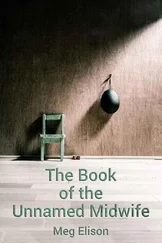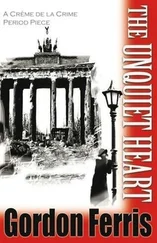The calls in the middle of the night, the long car rides out to God knows where. The worry, the frustration, the uncertainty, the sacrifice. Let Becka pick him up from now on. Make him take cabs.
She left the meat counter and walked to the far end of the store. She walked down the wine aisle. She chose the most expensive bottle. She left and then returned to the aisle for a second one.
“Where’s the food?” he asked.
She shut the door. “The line was too long. I thought we could pick up something on the way.”
“I was looking forward to veal,” he said.
She set the two wine bottles in back.
“You could buy wine but not veal?”
“I bought the wine at the liquor counter. There was no line there.”
“You couldn’t buy the veal there, too?”
“You know, it really pisses me off that you won’t let Bagdasarian try to help you,” she said. “With the exception of me, he’s the only one who hasn’t accused you of being crazy. I mean, he’s gone out of his way to argue that this is a real disease, and now he has something that might offer some evidence, some hope, to do for you what you’ve wanted, what you have searched and searched — what you have begged for, Tim — he says to you here it is, possibly, maybe, can’t guarantee it, but hey, it’s more than we’ve ever had. Good news, right? Exciting stuff! And you look away and say, let me think about it? What the hell is wrong with you? How many times—”
“Hey,” he said, “where is this coming from?”
“How many times have I sat with you in waiting rooms? How many specialists have we seen? I have flown to Ohio, to Minnesota, to California, to The fucking Hague! to be with you while you track them down. All the big names, all the experts. I have been there. Do you remember the chart, Tim? The log? What did you call it? Every day. Every day we recorded what you ate, what you drank, how you slept, how many hours, on and on… when you had your bowel movements, what change in weather that day, the temperature, the barometric pressure, for fuck’s sake. What else? Every insane insignificance! I kept a map full of pushpins! Here’s where you walked to on Monday. Here’s where you walked to on Wednesday. I listened to your rants, your rage, your frustration—”
“Can I get a word in?”
“And after all my struggle and all my patience, you can’t make one — more — fucking — effort?”
“Don’t you understand that if he comes up empty, I’ll want to kill myself?”
“You said you’d never do that.”
“But I would want to, Jane.”
“So that’s it? That’s the final word?”
“I said I would think about it.”
“And I get no say in it? After everything, I get no say?”
“It has to be my decision,” he said.
“Don’t think I don’t know why,” she said. “You’d have to wear that helmet at work. Don’t think I don’t know that’s your thinking.”
She threw the car in reverse, then suddenly slammed on the brakes. She had come close to hitting a mother and daughter as they passed by.
They drove home in silence and did not stop for dinner. On their way up the drive, they saw the lights from Becka’s Volvo coming down. The two cars edged into the snowy margins. They rolled down their windows.
“Where are you going?”
“Nowhere.”
“Where are you going, Rebecca?”
Becka turned impatiently to look through the windshield and then back to her mother. Tim leaned into Jane to better see his daughter. “I have a show,” she said.
“This is a school night.”
“School night? Are you serious?”
“Where’s the show?”
Becka unclipped her seat belt and pivoted around to the backseat, where her guitar case lay. She straightened herself and held a flyer out the window. Jane took it and read. Then she passed it to Tim without looking at him.
“It’s not an open mike?”
“I just gave you the flyer, Mom.”
Tim was reading the flyer. “This has your name on it,” he said through the window.
“It’s just around here,” she said. “Not like in the city or something.”
“Why didn’t you tell us about this sooner?”
“Because I didn’t want you coming, ” she said. “Besides, what were the chances of that anyway? Can I go now?”
Jane made her promise to be home by one and Becka continued down the drive. Jane pulled into the garage, reached in back for the wine and stepped out. Tim was still reading the flyer when she entered the house.
R. H. Hobbs was a stormer. He stepped out of the car before the driver had a chance to open the door and he stormed through the lower lobby and up the escalator to the mezzanine. He stood at the elevators making the people around him nervous. He was the first in and somehow the first out, after the women. He stormed through the glass doors into Troyer, Barr’s reception area and drummed his fingers on the front desk. The receptionist took his instructions, picked up the phone and silently urged it to ring faster. R.H. was this way even when he didn’t have a murder indictment hanging over his head. While waiting for one of the team’s associates to show up and lead him back, he tried sitting on the sofa, but then stood and walked over to the window. He vigorously shook the change in one of his pockets while peering out the glass. His gaze failed to alight on anything so he took his hands out of his pockets and ran them over his slick, brutally dyed hair, smoothing down his widow’s peak as he walked back to the receptionist to ask her how much longer he was going to have to wait. He had been there just forty-five seconds. The receptionist picked up the phone to make another call when Tim appeared.
“Holy hell, look who it is,” said R.H. “An attorney I used to know. I wonder how I might retain his services.”
“How are you, old friend?” said Tim.
“Looking at jail time,” said R.H. “You might have heard.”
R.H. extended his hand. Tim’s hands were badly frostbitten but he didn’t feel he could deny him. He fought the urge to cry out as R.H. squeezed and pumped.
“Maybe I’m just being a prima donna because my life is on the line, but would it kill you to return my calls?”
“I’ve not been as attentive as I’ve needed to be, R.H.,” he said, leading his client out of the staid lobby into the firm’s quiet interior. “But I haven’t neglected you, despite how it might appear, even as I’ve had to deal with Jane’s upcoming surgery.”
“Uh-huh,” said R.H. “And what kind of cancer is it?”
“I’m afraid it’s spread. It doesn’t look good.”
“I’m sorry to hear that. Why are you carrying that backpack?”
“This? Doesn’t it make me look like a schoolboy?”
“And you’re wearing snow boots. Why are you wearing snow boots?”
“There is a funny story about these boots, R.H. You’ll get a kick out of it.”
Suddenly R.H. stopped. He turned to face the wall. One of his knees buckled. Tim thought the older man was having a heart attack. But then R.H. covered his eyes with his hand and tucked the other hand under his arm and began to cry. He looked a little like the disgraced Nixon. His crying built to a steady heaving through thick nostrils. “Why is this happening to me?” he asked, struggling to breathe. “I swear to God in heaven I’m innocent.”
Tim pivoted in front of R.H. to shield him from hallway onlookers. He placed a hand on his shoulder. He didn’t know what to say.
“I’m an innocent man.”
Tim kept his hand there until R.H. pulled out a handkerchief and began to collect himself.
They were arrayed around the conference room table. Peter, the senior associate, had before him the manila envelope that contained the sketch of the man Tim had encountered on the bridge. To Tim’s annoyance Mike Kronish had asked to sit in on the meeting. A secretary put her head in to inform the four men that the detective and the assistant district attorney had arrived.
Читать дальше












